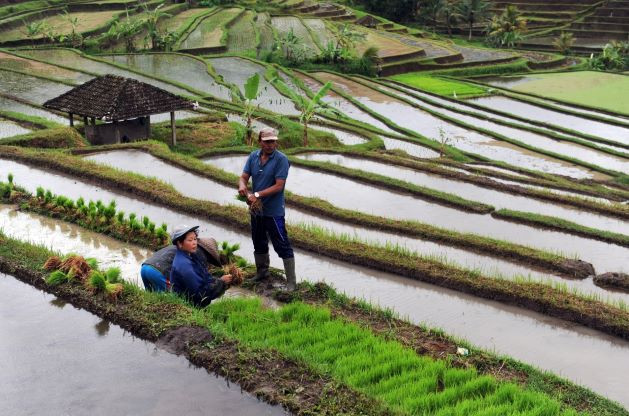Popular Reads
Top Results
Can't find what you're looking for?
View all search resultsPopular Reads
Top Results
Can't find what you're looking for?
View all search resultsNourishing humans, nurturing nature: Indonesia’s heritage for agrifood systems
Agrifood systems contribute to a third of global greenhouse gas emissions – further intensifying climate impacts that disrupt agricultural productions.
Change text size
Gift Premium Articles
to Anyone
I
n the face of escalating food insecurity, climate change, and biodiversity loss, many of the solutions we desperately seek today have already been devised by our ancestors. Indonesia, with its rich agricultural heritage, offers a unique model for how traditional systems can meet modern challenges.
Last month, the salak (or snake fruit) agroforestry system in Karangasem, Bali, was recognized as the first ever Globally Important Agricultural Heritage System (GIAHS) by the Food and Agricultural Organization of the United Nations (FAO) in Indonesia. This recognition highlights how age-old practices can provide a blueprint for sustainable future; particularly for low- and middle-income countries, and island nations.
GIAHS recognizes agricultural systems that have not only withstood the test of time but continue to thrive as dynamic agroecosystems where communities maintain a deep, interwoven relationship with their environment.
These living heritage sites are globally significant for their ability to demonstrate food and livelihood security, agrobiodiversity, sustainable knowledge systems, cultural traditions, and exceptional landscapes.
To date, the FAO has designated over 80 such sites worldwide, with Bali’s salak agroforestry system being Indonesia's first entry into this prestigious network; following Sao Tome and Austria.
At the heart of this recognition is Karangasem’s salak agroforestry system, where Balinese farmers practice the traditional subak abian or dryland subak management system. Using a five-strata cultivation model that optimizes land, this system integrates salak with multiple layers of crops, including food crops, fruits, vegetables, and medicinal plants, creating a rich, biodiverse agricultural landscape that ensures sustainable food security and livelihoods throughout the year.
While these practices may seem like relics from the past, they offer practical, modern solutions to global food security challenges.
This connection between agriculture and cultural wisdom is deeply rooted in Bali’s broader philosophies, such as Tri Hita Karana, which emphasizes harmonious relationships between humans, nature, and spirituality. These philosophies, recognized as UNESCO Cultural Landscapes, reflect the same ancestral knowledge that underpins the salak agroforestry system.
Together, they offer valuable insights into how balancing human needs with environmental stewardship can address today’s global challenges—many of which stem from our failure to nourish both people and the planet in harmony.
Agrifood systems contribute to a third of global greenhouse gas emissions – further intensifying climate impacts that disrupt agricultural productions. Additionally, food loss and waste account for 8 to 10 percent of these emissions.
By drawing from Indonesia’s heritage of traditional knowledge, such as the salak agroforestry system, we can offer a pathway to reduce food loss and waste. Countries and communities that adopt similar practices can benefit from improved food security, better access to healthy diets, reduced malnutrition, and a smaller greenhouse gas footprint.
The salak agroforestry also sequesters carbon, enhances agrobiodiversity, maintains the existing topography, helps avoid erosion and conserves water. It provides water as one of the environmental benefits to support thousands of hectares rice fields and other purposes in 10 villages along the Buhu River, a river in which the upstream is located at the site and receives environmental benefit from the site.
The Agriculture Ministry welcomes the GIAHS designation of Bali’s salak agroforestry, recognizing its significant ecological and socio-economic benefits. This system not only supports biodiversity and sustainable land use but also provides employment opportunities, particularly for young people, through exported fresh fruits, processed products and agrotourism.
It can unlock more financing opportunities and attracts private sector investments, further strengthening the local economy and empowering rural communities. The Indonesian government is committed to leveraging this recognition as a catalyst for further promoting and developing the salak agroforestry system in Bali, ensuring its continued contribution to sustainable agriculture amid modern challenges.
FAO puts equal importance to the role of scientific knowledge and traditional knowledge in achieving a hunger-free world, especially those coming from small-scale producers. Culture, tradition and ancestral knowledge are embedded in many ways of nourishing Indonesian people and nurturing Indonesian nature. Starting from salak agroforestry, Indonesia can identify more such systems across the country and share its heritage to the world.
Indonesia can lead the examples of building the resilient, efficient, sustainable, and inclusive agrifood systems, leaving no one behind, and FAO is committed to work together with Indonesia in this endeavor.
***
Andi Amran Sulaiman is Indonesian agriculture minister. Rajendra Aryal is FAO representative in Indonesia and Timor-Leste.











